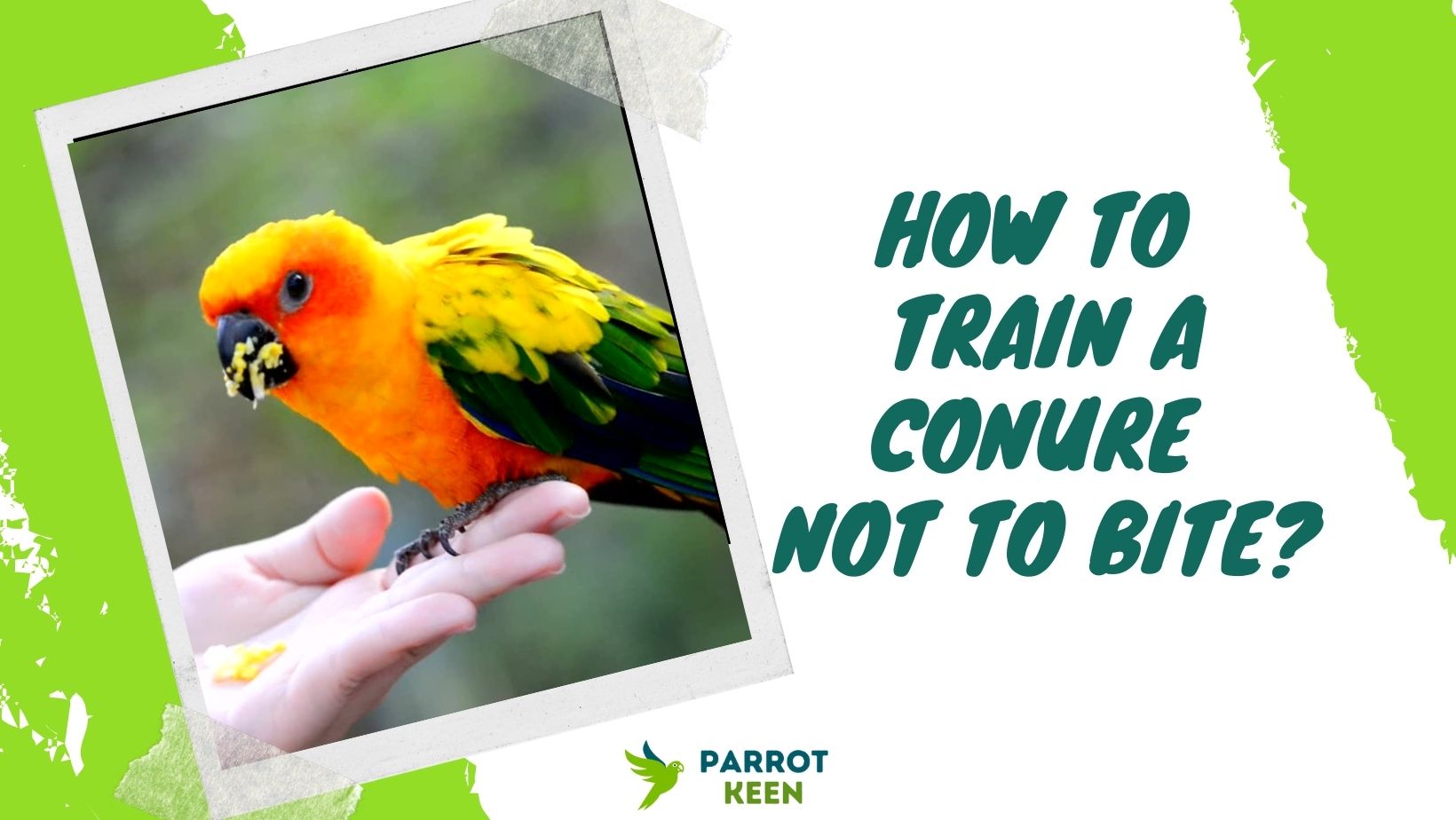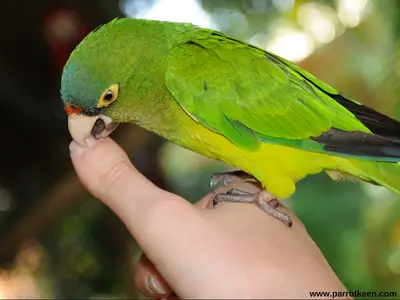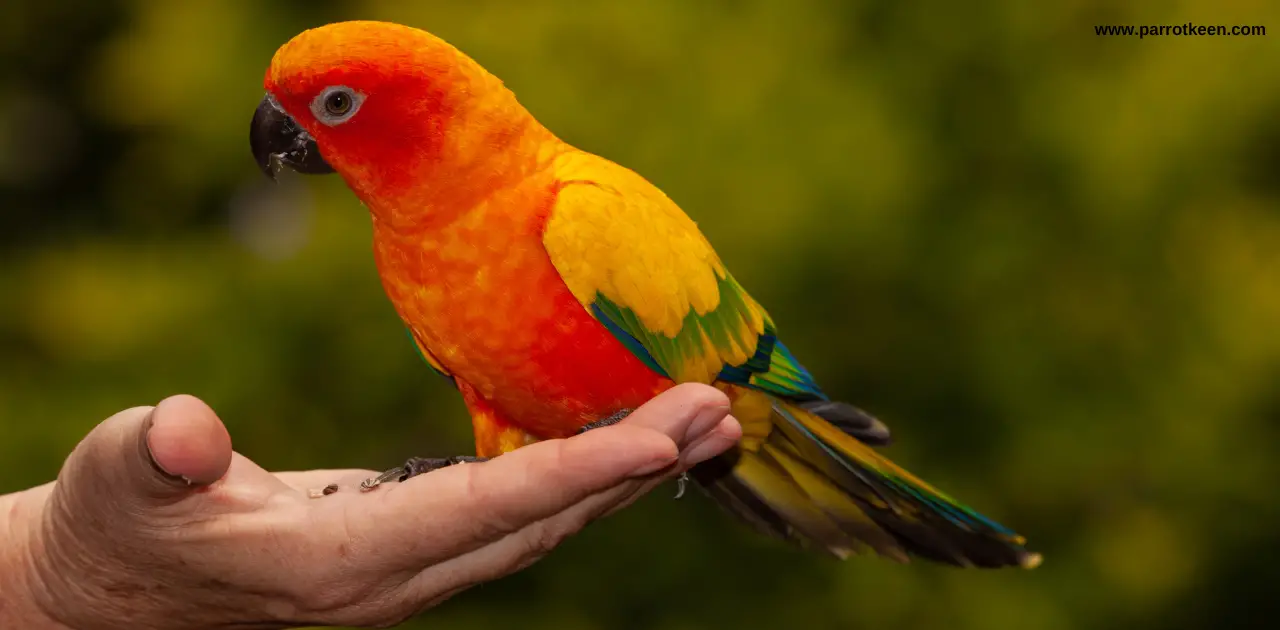
How to Train A Conure Not to Bite?
If you have a conure, then you know they can be quite the handful sometimes. They are very active birds and love to play, but they can also be quite stubborn and determined. Biting is one of the most common issues that bird owners face with their conures.
Conures are known for being one of the nippiest bird species out there! If your conure is biting, it can be quite frustrating.
This blog post will discuss how to train your conure not to bite and provide tips on how to discipline your conure from biting in the future.
I’m writing this article from personal experiences with my conure. A few months ago, it happened that my conure started biting me when I tried to pet it. It was painful as it would clamp down on my finger with its beak and hang on.
I tried many things to stop it from biting, but nothing worked until I did some research which I will be sharing with you in this blog post.
Let’s start with why these birds bite in the first place. A conure will bite you for many reasons.

Why Do Conures Bite?
Conures are a type of parrot known for being very affectionate and loving. However, they can also be quite nippy, and many owners report that their conures bite them regularly. There are several reasons why conures bite; they are:
-
Fear
Conures may bite out of fear. If they feel threatened or are startled, they may bite to defend themselves. This is usually a learned behavior from previous negative experiences. For example, if a conure was handled roughly in the past, it may become fearful of being handled and bite when someone tries to pick it up.
-
Territorial Aggression
Conures may also become aggressive and bite due to territoriality. They may view their cage or area as their territory and become defensive when someone enters it.
This is especially common with males during the breeding season. Suppose a conure feels that its territory is being invaded. In that case, it may become aggressive and bite in order to protect it.
-
Possessiveness
One common reason why conures bite is possessiveness. They may become possessive of their food, toys, or even their owner and become aggressive when someone tries to take them away.
This can be a problem if the conure doesn’t have enough food, toys, or attention and becomes jealous of others. Conures may also become possessive of their mate and bite anyone who comes near them.
-
Pain or illness
Sometimes, conures bite because they are in pain or are ill. If a conure is sick or injured, it may be more likely to bite out of fear or aggression. Pain can also make a conure more irritable and likely to bite.
If a conure seems to be biting more than usual, it’s important to take it to the vet to rule out any medical causes.
-
Baby bird behavior
Baby birds often bite to explore their environment and play with their caregivers. This behavior is normal and should not be discouraged, as it helps baby birds to learn about the world around them.
However, if bites become frequent or overly aggressive, it may be necessary to provide the bird with more toys and environmental enrichment.
-
Playtime
Conures love to play and explore their surroundings, and biting is one way they interact with their environment. They may bite toes, fingers, or clothing as part of their playful exploration. Other times, they may bite out of curiosity or in response to something that startles them.
Although conures are usually gentle birds, their bites can be painful. It is crucial to handle them carefully and teach them appropriate biting behaviors.
With time and patience, most conures can learn to control their biting impulses and enjoy a lifelong bond with their human companions.
How to Train and Teach A Conure Not To Bite?

It is a known fact that these little creatures can be nippy.
If you want to train your conure not to bite, you can do a few things.
The first thing a pet owner does is to determine the cause of the biting and study your bird’s body language. Once you know what is causing the biting, you can begin to take steps to stop it.
Here are some tips on how to train a conure not to bite:
- Start With Basic Commands
Start by teaching your Conure basic obedience commands such as “step up,” “come,” and “no bite.” These commands will help you to assert your authority over the bird and get it to listen to you.
- Try To Preven Boredom
Conures are intelligent and active birds that require plenty of toys and activities to stay amused and avoid boredom. If a conure becomes bored, it may start to nibble on your fingers as a way to get attention.
To prevent this, ensure that your bird has plenty of stimulating toys, including chew toys, puzzle toys, and foraging toys. In addition, give your conure plenty of time out of its cage to explore, play, and socialize.
- Training your bird with positive reinforcement
One of the best ways to do this is through positive reinforcement. Whenever your bird displays desirable behavior, such as sitting calmly on your finger, make sure to offer plenty of praise and treats.
With time and consistency, your conure will learn that biting results in a loss of attention and rewards, while good behavior is rewarded with treats and affection. In no time at all, you and your conure will be best friends.
- Put them gently and walk away.
Start by putting them gently on your finger and then walking away. This will teach them that biting does not equal attention or affection.
With a little patience and perseverance, you can have a well-mannered conure that is a joy to be around.
Things to Consider Before Buying A Conure.
When it comes to buying a conure, there are a few things you need to take into consideration.
First, what size do you want? Conures come in a range of sizes, from the small sun conure to the large green-cheeked conure.
Second, what color do you want? Conures come in various colors, from the vibrant sun conure to the more subdued green-cheeked conure.
Third, When considering what type of bird is right for you, it is crucial to consider the bird’s personality. Conures have various personalities, from the playful sun conure to the more reserved green-cheeked conure.
Conures are known for their playfulness and can be a lot of fun to watch. However, they can also be very loud, so a conure may not be the best choice if you are looking for a quiet pet.
In addition, conures require a lot of attention and care, so if you are not prepared to devote the time to your new pet, you should consider another type of bird. But a conure may be the perfect choice if you are looking for a playful and loving companion.
Lastly, what price are you willing to pay? conures can range in price from a few hundred dollars to over a thousand dollars.
With so many factors to consider, it’s important to do your research before buying a conure. By taking the time to consider all of your options, you can be sure to find the perfect bird for you and your family.
How to Discipline Your Conure To Stop Biting?
One common problem that many conure owners face is biting. Although it may seem like your bird is doing this out of aggression, in most cases, it’s simply a matter of your bird wanting attention. Fortunately, you can use a few simple techniques to discipline your bird and stop the biting.
-
Give Your Bird More Chew Toys
It’s perfectly natural for a conure to want to chew on things. They are, after all, birds, and their beaks are meant for chewing. The problem is that your conure doesn’t know the difference between a toy and your finger.
That’s why giving your bird plenty of toys to chew on is important. Chew toys not only provide an outlet for your conure’s natural desire to chew, but they also help to keep its beak sharp and in good condition.
-
Don’t Respond With Anger
Birds are very sensitive creatures and can sense when you’re angry or upset. If you respond to your conure’s biting with anger or aggression, it will only reinforce the behavior. Instead, try to remain calm and constructive when disciplining your bird.
-
Reward Good Behavior
When your conure stops biting, make sure to praise it and give it a treat. This will help your bird understand that biting is not acceptable behavior and that it will be rewarded for refraining from biting.
Over time, this positive reinforcement should help to discourage your conure from biting altogether.
Conclusion: How to train a Conure Not to Bite?
Although Conures are known for being friendly and interactive, they can also be prone to biting. If your bird has a habit of nipping at you or others, there are ways to train it not to do so.
By following these simple tips above, you can help ensure that your conure remains a loving and playful member of the family without resorting to biting.
Have you had success training your conure not to bite? Let us know the technique or trick that worked for you in the comments below.

Hi, I am Thersa and Welcome to ParrotKeen, your number one place to get all the information you need about your cute parrot. I hope You Find it useful.
